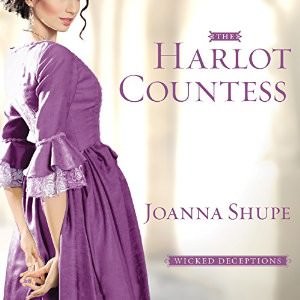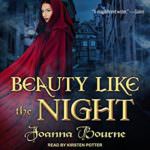 Narrated by Carmen Rose
Narrated by Carmen Rose
This is the middle book in Joanna Shupe’s Wicked Deceptions trilogy, and having enjoyed the first book, The Courtesan Duchess, in print (I gave it a B at AAR), I decided to pick up the second in audio. The author impressed me with her storytelling and her ability to create strong, well-defined characters as well as to turn up the heat with some crackling sexual tension and steamy love scenes. The Harlot Countess is certainly no slacker in the steam department, and Ms Shupe has once more created a couple of interesting characters; but I can’t deny that the plotline – much of which revolves around the massive misunderstanding the couple experienced a decade earlier and their inability/unwillingness to talk about it until well into the book – is somewhat frustrating at times.
Owing to a malicious rumour circulated by a thwarted suitor, Lady Margaret Neeley is the subject of such cruel and outraged gossip that she is ruined at her début and dubbed “The Half-Irish Harlot”. Quickly rushed into marriage with a man several decades her senior, Maggie spends most of the next decade living quietly in Norfolk, but she has never forgotten – or forgiven – the cut direct given her by the one man she had thought would stand by her on that horrible night.
Moving forward almost a decade finds Simon Barrett, Earl of Winchester, a rising star in political circles, even tipped as a future prime minister. But for the past year, his standing has been constantly undermined by the merciless lampooning of a popular political cartoonist named Lemarc, whose illustrations depict Simon in his “illustrious, drunken youth”, and nickname him “Lord Winejester”. Simon wants to find Lemarc and persuade him to stop his attacks, but there is a snag: nobody knows who Lemarc is or how to find him.
When the widowed Lady Maggie Hawkins returns to London following the end of her mourning period, she is still the subject of unpleasant gossip. But this Maggie is a different woman from her younger self. Her marriage was not a dreadful one; her late husband allowed her the freedom to pursue her artistic studies and over the years, she has grown into a strong and self-assured young woman. Her widowhood allows her to live the life she chooses for herself, and not to bow to stifling convention. Her scandalous parties are legendary (and very popular), and she is assumed to have had a string of lovers over the years. She does nothing to refute that assumption, believing – quite rightly – that she doesn’t have to justify herself to anybody.
Simon is as immediately captivated by Maggie as he was ten years before – and, unfortunately, just as prone to making the wrong assumptions about her. He doesn’t understand why Maggie is so frosty towards him and so determined to avoid his company; and Maggie still doesn’t know why he literally turned his back on her when she needed him the most. But their meeting at the print-shop that displays Lemarc’s artwork gives Simon an idea; Maggie moves in artistic circles and perhaps is well-placed to help him to locate the artist, so Simon asks for her help to do just that.
Lemarc’s identity is disclosed early on in the story, so it’s not a spoiler to say that Simon is in for a shock!
As Simon and Maggie begin to spend more time together, the spark which had drawn them together the first time is re-ignited and this time, is irresistible. The relationship between them is highly sensual and well-developed; they begin an affair fairly early on in the book and there is no mistaking their overwhelming lust for each other. But as the story continues, Simon comes to realise that even though they are already lovers, what he really wants is to court Maggie properly, showing her tenderness and affection as well as physical passion. It’s easy – sometimes – to be annoyed with Simon for his persistence in believing the rumours that continue to circulate about Maggie and her supposed sexual voracity. Yet the author goes a long way towards redeeming him by the way in which she has him falling for Maggie in spite of that belief, and in the way she shows him gradually coming to realise that the woman he is coming to know cannot be the promiscuous trollop society paints her.
The secondary plotline in the book concerns Maggie’s involvement in a scheme that helps young women – mostly prostitutes – who have been brutalised and finds them safer places to live and work; and Simon’s attempt to get a bill through Parliament which would force men who violate women to make some sort of financial restitution. Having been a witness to sexual violence in his youth (he saw his nanny assaulted by one of the grooms when he was a boy), he is determined to do something to help women in similar situations. He and Maggie clash over his plans, which he fails to see are far from ideal, but ultimately, their aims are the same. The problem is that Maggie’s enquiries and her relationship with Simon are drawing the wrong sort of attention; the sort that could place her in great danger.
I enjoyed Carmen Rose’s narration in this book far more than in the last audiobook of hers I listened to (All the Ways to Ruin a Rogue). She captures the sensuality inherent in the central relationship very well, and I enjoyed her characterisations of the two principals, Maggie’s low, almost velvety speech contrasting strongly with Simon’s more clipped, authoritative tones. She differentiates well between all the characters, particularly between Simon and his friends, Colton and Quint, so that I was never confused when they all appeared in scenes together. In fact, I like the way Ms Rose portrays the male characters; her voice is naturally fairly deep, so she doesn’t need to drop the pitch very much, but she adds a slightly harder edge and brightness of tone to delineate the men which works well and sounds very attractive. The narrative is expressively read and well-paced, but her tendency to take breaths in odd places and thus add a strange emphasis to some words and phrases is still in evidence. I suppose I’ve listened to her enough times now to be used to it, and there are times at which it is more noticeable than others – but I still wish she didn’t do it, as all the other aspects of her performances are good enough to make her an A grade narrator.
Overall, I enjoyed listening to The Harlot Countess in spite of my reservations about the set-up. The romance is well developed with both Simon and Maggie coming to understand the reasons behind their decade-long separation and reaching a new appreciation of each other. Ms Shupe is a new author in the genre, and I will definitely be looking to read and listen to more of her books.
Caz
Narration: B
Book Content: B
Steam Factor: Glad I had my earbuds in
Violence Rating: Minimal
Genre: Historical Romance
Publisher: Tantor Audio
The Harlot Countess was provided to AudioGals by Tantor Audio for a review.
[jwl-utmce-widget id=32435]



1 thought on “The Harlot Countess by Joanna Shupe”
Comments are closed.